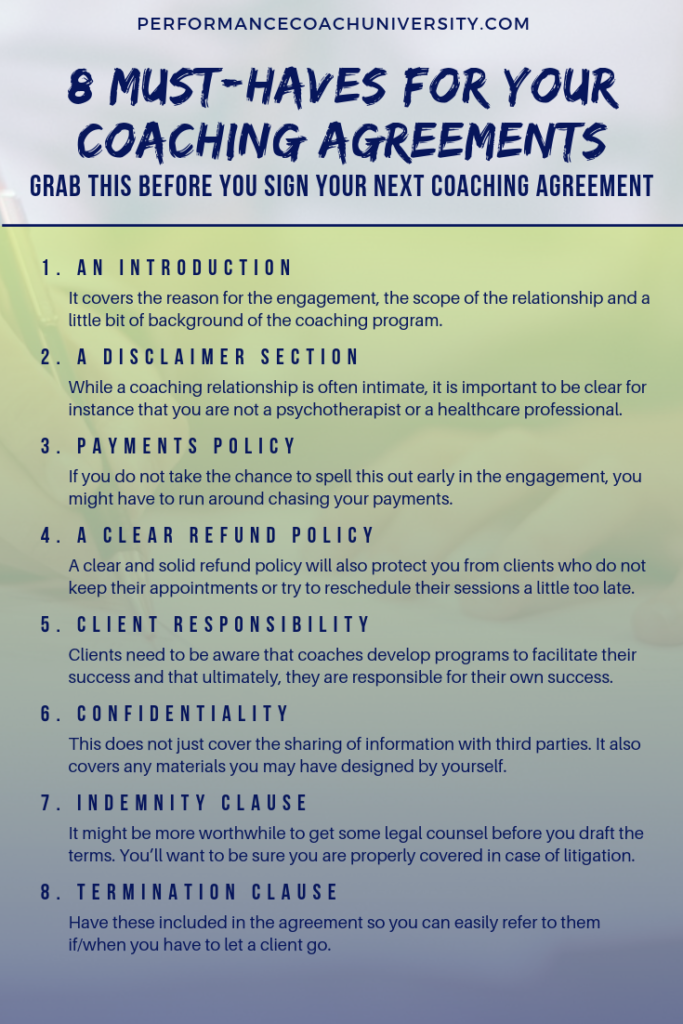A coaching agreement helps both the coachee and the coach come to a common understanding of the expectations in their journey together. As a coach, a written and signed coaching agreement can help get you out of uncomfortable situations with your clients.
Coaching is a client-centric and client driven process in which the coach is more of a value-addition partner. This is a basic rule of engagement in coaching and must underpin any coaching agreements. However, keeping professional objectivity in what is often an intimate relationship is not the simplest thing in the world.
Many freelancers, including coaches, usually fail to establish the relationship on a business level, at least not from the outset. Some believe it to be unnecessary while others just want to avoid having an overly formal relationship.
Why an Agreement?

A coaching agreement is critical because it serves two main purposes. First, it sets the ground rules for the coaching relationship so that both parties are aware of their obligations. Secondly, it effectively minimizes the liabilities of the coach and gives both parties peace of mind while offering the necessary protection to the coach.
However, contracts or agreements are not just used to tie up your clients in knots and to spell out what they can and cannot do. They are documents that cement relationships, freeing up both parties to focus on the most important things like how to achieve goals.
A coaching agreement is also a great way to show your clients that you are on top of things right from the start. It draws the professional lines, within which the relationship should thrive, and helps to build confidence in the program. By outlining expectations from both parties, a coaching agreement also guides the coachee on how to make the most out of your program.
What to Include in the Coaching Agreement
There are several important elements to include in a coaching agreement. The idea is to refine your coaching agreements as you go along and as you sign up different clients. However, here are some must-have sections of a coaching agreement:
Coaching Agreement Must-Have #1 : An Introduction
A proper introduction sets the stage for other elements of the agreement. It covers the reason for the engagement, the scope of the relationship and a little bit of background of the coaching program.
Being clear about the scope helps to set expectations for both parties and also prevent potential disputes down the road. However, if you want to keep the relationship fluid you’ll want to avoid stating expectations in absolutes.
Coaching Agreement Must-Have #2: A Disclaimer Section
Working with a life coach can be a source of major life changes and great success. A coach can even have many real life and first hand examples of breakthroughs and successes. However, it is crucial to be clear that you do not bear a magic wand and that you won’t be working any miracles.
Your clients may easily have unreasonable expectations or interpretations of what your services entail. And while you are at it, it is also important to draw the line on the kind of services you will be providing. While a coaching relationship is often intimate, it is important to be clear for instance that you are not a psychotherapist or a healthcare professional.
While some coaches even advertise financial breakthroughs for some of their previous clients, especially if they were businessmen or entrepreneurs, a coaching agreement should have an earnings disclaimer.
Coaching Agreement Must-Have #3: Payments Policy
If you do not take the chance to spell this out early in the engagement, you might have to run around chasing your payments. A coaching relationship can become so personal that it becomes difficult or uncomfortable to discuss money. Therefore, payment terms should be made prior to the commencement of the program.
It is incredibly important to cover potential eventualities and spell out how both of you will handle them. For instance, if the client delays the payment or what happens when they opt out midway through the program.
Coaching Agreement Must-Have #4: A Refund Policy
This section should cover if, when, and how refunds are accepted. It will protect you against refund claims after having done your part. A clear and solid refund policy will also protect you from clients who do not keep their appointments or try to reschedule their sessions a little too late.
Coaching Agreement Must-Have #5: Client Responsibility
Clients need to be aware that coaches develop programs to facilitate their success and that ultimately, they are responsible for their own success. This section lets the client know and agree that the results depend on their efforts.
This section will also help to prime your client to take action down the road. By being fully aware of their responsibility right from the start, clients likely get into the program with more energy and positivity.
Coaching Agreement Must-Have #6: Confidentiality
It’s difficult to have a fruitful coaching relationship if both you and your client do not share some personal information, including the fact that you are working together. However, a confidentiality clause in a coaching agreement does not just cover the sharing of information with third parties. It also covers any materials you may have designed by yourself.
You could lose potential income if your clients distribute your materials to everyone out there for free. Additionally, you could lose your competitive edge if other coaches out there begin to use your materials.
Coaching Agreement Must-Have #7: Indemnity
For this section, it might be more worthwhile to get some legal counsel before you draft the terms. Even if you spend money to get this advice, it will be money well spent and it will cover you against any potential legal liabilities when “shit hits the fan.” Therefore you’ll want to be sure you are properly covered in case you have to end up in court.
Coaching Agreement Must-Have #8: Termination Clause
As a coach, you must realize that you are working with human beings and that not all relationships work out in the end. Other than coming to the end date or physical inability to continue the coaching relationship, you might need terminate the relationship. Have these included in the agreement so you can easily refer to them when you have to let a client go.

Of course people don’t hire coaches the same way they hire accountants or other business professionals. While a coaching agreement is still a binding agreement, the nature of the relationship will likely not be a rigid one. Therefore, the tone of the agreement is crucial.
The trick is to get a balance between the necessary legal terms and setting the tone for the relationship. It may also need to be more detailed if you are working with organizations. The idea is to keep refining it with every new client until you have the perfect document.
To your success,
Jairek Robbins
Did you know that Performance Coach University is an ICF & BCC Accredited Program?
If you want to make an impact and add deeper meaning and purpose to your life through coaching, now is the time! Now more than ever people are openly looking for coaches, someone in their corner to help guide them to achieving their goals. They want to perform better in their jobs, lives, health, and relationships and they know working with a coach is the answer. Let that coach be you!
Learn more at https://performancecoachuniversity.com/request-application/
